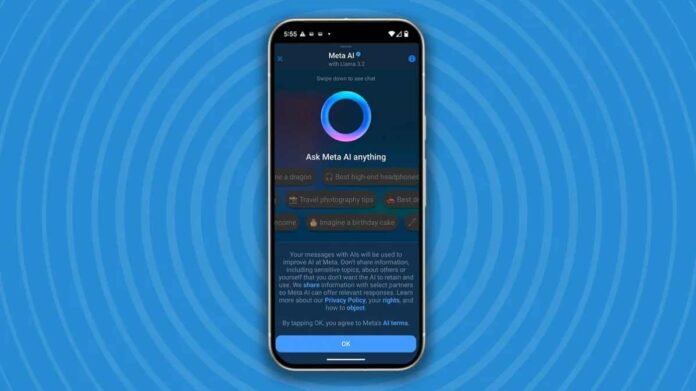- Meta will use Meta AI conversations to personalize ads on Facebook and Instagram starting December 16.
- There is no opt-out option for users.
- WhatsApp is excluded from the plan for now.
- The rollout skips Europe and the UK due to privacy laws.
Meta is preparing to use conversations with its AI assistant to personalize ads and recommendations on Facebook and Instagram. Starting December 16, the tech giant will include data from chats with Meta AI in its massive advertising network. There is no way to opt out.
Meta says the move will help deliver more relevant ads and content. But critics argue it marks another step toward deeper data collection that blurs the line between private chats and public posts.
Your Chats Could Become Advertising Data
Meta’s AI chatbot, which lives inside Facebook Messenger and Instagram’s direct messages, has been promoted as a helpful assistant. Many people use it to ask for restaurant tips, plan trips, or even get workout routines.
Soon, those same conversations will be treated like any other data point that shapes the ads and content you see. If you ask Meta AI about hiking trails, you might later see ads for hiking gear or posts about nature spots.
Meta explains that this is similar to what already happens when you like a page or comment on a post. But chatting with an assistant often feels more personal. The shift highlights how private-seeming interactions can feed the same advertising machine.
No Opt-Out Option and Limited Privacy Protections
Users will start receiving notifications about the new policy this month. But there is no button to turn it off. The only way to avoid having your Meta AI conversations used for ads is to stop talking to the chatbot altogether.
For now, WhatsApp is excluded from this data use. That means conversations with Meta AI inside WhatsApp will not influence ads, at least for the moment.
Meta says it will not use chats to target ads related to sensitive categories like politics, religion, sexuality, or health. However, privacy advocates warn that the boundaries of what counts as sensitive can be vague. There is also concern that errors in classifying content could lead to inappropriate ad targeting.
Europe Left Out For Now
The new ad-targeting plan will not roll out in Europe or the UK yet. Privacy laws in those regions, especially the European Union’s General Data Protection Regulation, limit how companies can use personal data.
Meta says it is working to adapt the system for Europe but expects delays. In the meantime, users in countries covered by these regulations will not see ads shaped by their AI chats.
The Growing Trend of AI-Powered Ads
Meta is not alone in pushing the boundaries of how AI conversations are used. Google is experimenting with using its Gemini AI to influence advertising and content recommendations. Amazon is doing something similar with its Rufus chatbot.
The trend suggests that conversations with AI tools are becoming a valuable source of behavioral data for big tech companies. As AI assistants become more natural and human-like, people may feel more comfortable sharing personal details. This can make the data collected even richer for advertisers.
The shift also raises questions about transparency. Many users may not realize that casual questions to an AI assistant are treated like public actions such as liking a post or clicking an ad.
A New Phase in Personalized Advertising
Meta’s move signals a broader shift in online advertising. Traditional signals like clicks and page likes are now being joined by the insights gathered from conversations.
For many users, it will feel like a natural extension of what already happens on social platforms. For others, it may seem like a new level of surveillance.
The company is betting that most people will accept the trade-off. They expect that the promise of more relevant ads and recommendations will outweigh concerns about privacy.
Follow TechBSB For More Updates

